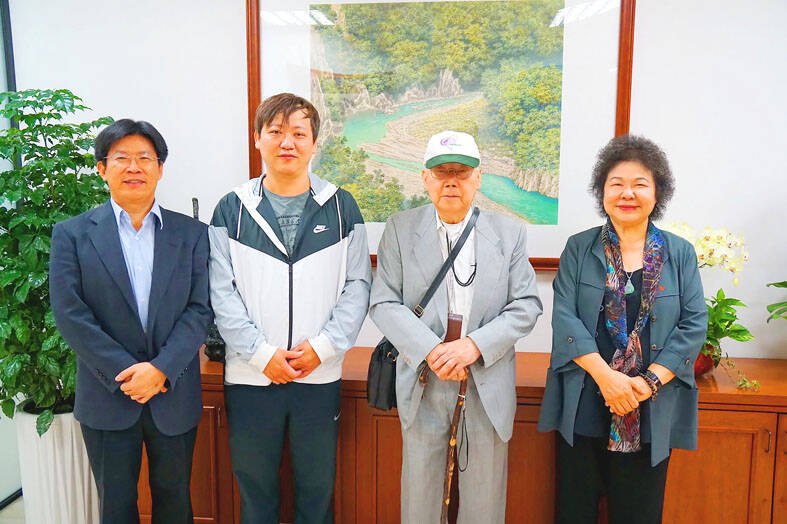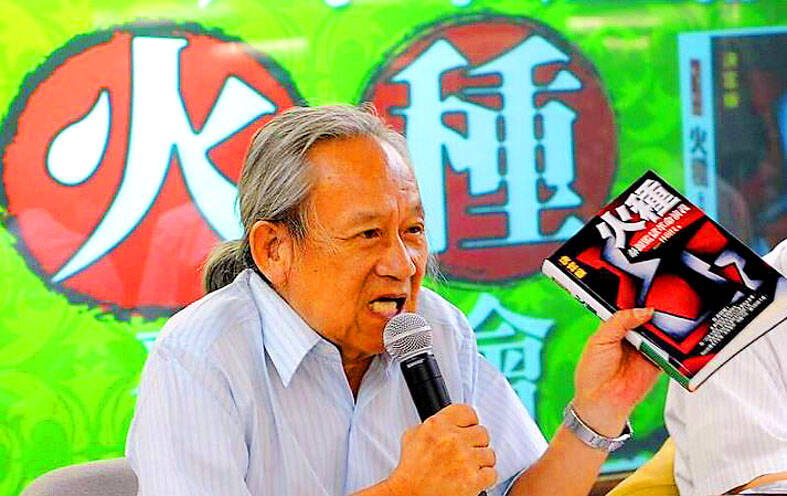Prominent Taiwanese independence activists Lin Shui-chuan (林水泉) and Lin Shu-chih (林樹枝) passed away this month.
Lin Shui-chuan, 86, a democracy and independence movement trailblazer, died after a fight with illness in Los Angeles on Aug. 3, his family said on Tuesday.
He was the central figure related to a landmark case that set the precedent for victims of the White Terror to demand exoneration and compensation.

Photo courtesy of Lin Shui-chuan’s family via CNA
Lin Shui-chuan had long sought exoneration and state compensation for being imprisoned during the Martial Law era on charges that he said were manufactured to silence criticism and prevent electoral competition against the then-ruling Chinese Nationalist Party (KMT).
In 1961, Lin Shui-chuan ran as an opposition candidate to the KMT and criticized the party’s authoritarian rule. He was arrested and declared a “thug,” which enabled the authorities to imprison him for 20 months without trial by using special police powers granted by martial law.
Three years after being sent to prison for the first time, Lin Shui-chuan was elected a Taipei City councilor, but was arrested for conspiracy to subvert the state before he could finish his first term. He served a sentence of 10 years in prison.

Photo: Taipei Times
The Transitional Justice Commission in 2000 voided Lin Shui-chuan’s guilty sentence for subverting the state, but said that it lacked the mandate to dispose of administrative detention as stipulated by the Compensation Act for the Wrongful Trials on Charges of Sedition and Espionage during the Martial Law Period. (戒嚴時期不當叛亂暨匪諜審判案件補償條例)
In March, the Ministry of Justice, which later took over the review of cases from the commission with a broadened mandate, said the ruling that Lin Shui-chuan was connected to organized crime was also illegal.
Lin Shui-chuan’s case enabled others who suffered the loss of life, freedom, or property from acts authorized via special police powers to seek redress, Lin Shui-chuan’s family members said.
“Lin was vilified by the KMT for the first half of his life. Thanks to the government, he was rehabilitated in the second half of it and could face death knowing his dignity is intact,” they said.
Separately, Taiwanese independence advocate and White Terror victim Lin Shu-chih, 77, was on Aug. 14 found dead in his apartment in New Taipei City’s Tamsui District (淡水).
He was discovered by his friend and photographer Chiu Wan-hsing (邱萬興), who became worried as he was unable to reach Lin Shu-chih since the previous evening, Chiu said in a Facebook post later that day.
In 1971, Lin Shu-chih went to jail for the first time after accusing the KMT of corruption in a private missive to a friend, for which he was sentenced to 10 years in prison, and he served 80 months of that sentence, with the rest being commuted in 1975 when Chiang Kai-shek (蔣介石) died, Chiu said.
Two years after his release, Lin Shu-chih helped opposition politicians evade the crackdown following the Kaohsiung Incident in 1977, where soldiers and police suppressed a peaceful demonstration and used it as a pretext to neutralize prominent dissenters, Chiu said.
In 1980, Lin Shu-chih was convicted of sedition for giving aid and comfort to a known traitor and withholding information about a spy from the authorities, Chiu said, adding that he was sentenced to five years and four months in prison, with the formerly commuted sentence added.
Lin Shu-chih was tortured during both periods of incarceration, including being hit with truncheons while suspended in a sack, which broke all of his teeth, and being electrocuted in the genitals, which left him infertile, Chiu said.
Following the end of the martial law, Lin Shu-chih became a collector and editor of oral histories of the White Terror and a founding member of the Democratic Progressive Party (DPP), and played a role in human rights and transitional justice advocacy, Chiu said.

The Grand Hotel Taipei on Saturday confirmed that its information system had been illegally accessed and expressed its deepest apologies for the concern it has caused its customers, adding that the issue is being investigated by the Ministry of Justice Investigation Bureau. The hotel said that on Tuesday last week, it had discovered an external illegal intrusion into its information system. An initial digital forensic investigation confirmed that parts of the system had been accessed, it said, adding that the possibility that some customer data were stolen and leaked could not be ruled out. The actual scope and content of the affected data

‘LIKE-MINDED PARTNER’: Tako van Popta said it would be inappropriate to delay signing the deal with Taiwan because of China, adding he would promote the issue Canadian senators have stressed Taiwan’s importance for international trade and expressed enthusiasm for ensuring the Taiwan-Canada trade cooperation framework agreement is implemented this year. Representative to Canada Harry Tseng (曾厚仁) in an interview with the Central News Agency (CNA) said he was increasingly uneasy about Ottawa’s delays in signing the agreement, especially as Ottawa has warmed toward Beijing. There are “no negotiations left. Not only [is it] initialed, we have three versions of the text ready: English, French and Mandarin,” Tseng said. “That tells you how close we are to the final signature.” Tseng said that he hoped Canadian Prime Minister Mark Carney

POSITIVE DEVELOPMENT: Japan and the US are expected to hold in-depth discussions on Taiwan-related issues during the meeting next month, Japanese sources said The holding of a Japan-US leaders’ meeting ahead of US President Donald Trump’s visit to China is positive news for Taiwan, former Japan-Taiwan Exchange Association representative Hiroyasu Izumi said yesterday. After the Liberal Democratic Party’s landslide victory in Japan’s House of Representatives election, Japanese Prime Minister Sanae Takaichi is scheduled to visit the US next month, where she is to meet with Trump ahead of the US president’s planned visit to China from March 31 to April 2 for a meeting with Chinese President Xi Jinping (習近平). Japan and the US are expected to hold in-depth discussions on Taiwan-related issues during the

President William Lai (賴清德) yesterday bestowed one of Taiwan’s highest honors on Saint Vincent and the Grenadines (SVG) Ambassador Andrea Clare Bowman in recognition of her contributions to bilateral ties. “By conferring the Order of Brilliant Star with Grand Cordon on Ambassador Bowman today, I want to sincerely thank her, on behalf of the Taiwanese people, for her outstanding contribution to deepening diplomatic ties between Taiwan and SVG,” Lai said at a ceremony held at the Presidential Office in Taipei. He noted that Bowman became SVG’s first ambassador to Taiwan in 2019 and